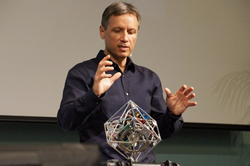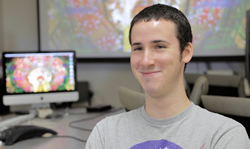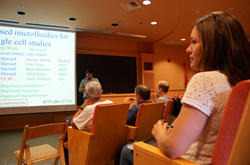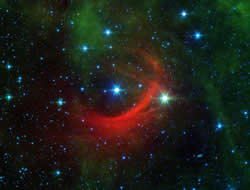HiPACC Education/Public Outreach Press Room. From: UCSB
The Education/Public Outreach Press Room highlights opportunities made available to K-12 or university students or the general public, to learn more about astronomy and computational or data science in all fields, offered by the UC campuses and DOE laboratories comprising the UC-HiPACC consortium. The wording of the short summaries on this page is based on wording in the individual releases or on the summaries on the press release page of the original source. Images are also from the original sources except as stated. Press releases below appear in reverse chronological order (most recent first); they can also be displayed by UC campus or DOE lab by clicking on the desired venue at the bottom of the left-hand column.
October 14, 2014 — Rise of the machines

With a few nudges, D'Andrea gets the Cubli to stay on its corner. Credit: Sonia Fernandez
UCSB 10/14/2014—It’s already happening: Machines, spurred by massive gains in processing power and versatility, are poised to change life as we know it. Thanks to ever-improving algorithms and the ability to make a multitude of calculations per second, machines can operate autonomously and with precision and speed. More importantly, they can learn, and perfect in a few hours what a human being would need years to accomplish. Is it the stuff of science fiction come to life, with sophisticated robots that can do a human’s bidding? Is it the beginning of a dystopian future, in which people are the ones becoming obsolete? A little of both. In a talk titled “Engineering the Future: Feedback Control and the Coming Machine Revolution,” Raffaello D’Andrea—engineering professor, dynamic systems expert and new media artist—discussed the state of the technology, where it could be going, and how society might be impacted as machines get smarter and humanity becomes more reliant on them. “There are various technological and algorithmic and social pressures that are really causing this coming machine revolution,” But he expressed three concerns: robots increasingly displacing jobs, the use of machines in warfare (specifically the threat of continuing escalation between technologically advancing societies), and humans’ increasing hyperdependence on machines. Other concerns include issues of privacy rooted in the increasing use of camera-equipped drones, and environmental problems that result from the accumulation of discarded parts. No concrete solutions have been identified to address the emerging drawbacks, and D’Andrea argues that humanity will have to take an active part in dealing with them as they come.
Read full UCSB Press Release
September 25, 2014 — Opportunity knocks

Senior Ari Kaplan compared simulated models to the Large Hadron Collider's data. Credit: Spencer Bruttig
UCSB 9/25/2014—Six undergraduate physics majors participating in this year’s Worster Summer Research Fellowships at UC Santa Barbara were paid to conduct 10 weeks of research—ranging from astrophysics to biophysics to theoretical physics—under the direct supervision of graduate student mentors. Among them, senior Joey Wong examined how heavy metals behave in merging galaxies—information that may offer hints about how the Milky Way and Andromeda will merge in a few billion years. Junior Sylvia Madhow learned computer programming and data analysis techniques in Ben Mazin’s astrophysics lab, working on a new technique for analyzing the readout from microwave kinetic inductance detectors (MKIDs) used for astronomy in the near infrared, optical, ultraviolet and X-ray. Said astrophysicist Crystal Martin, a professor in UCSB’s Department of Physics: “One of the great opportunities that big research universities can offer is not only helping students learn all that is known about a topic, but also teaching young people to go out and create new knowledge and answer unsolved questions.”

Read full UCSB Press Release
August 6, 2014 — Teaching the Teachers

JulieAnn Villa, one of four teachers in residence at the Kavli Institute for Theoretical Physics, attends a lecture in the “The Evolution of Drug Resistance” program. Credit: Sonia Fernandez
UCSB 8/6/2014—For two weeks in July, four high school teachers in residence at UC Santa Barbara’s Kavli Institute for Theoretical Physics (KITP) spent their days attending lectures highlighting “The Evolution of Drug Resistance” or “Dynamics of Planetary Interiors,” and participating in informal discussions and labs with researchers, postdoctoral scholars and professors. The goal of the new teachers-in-residence program is to expose high school teachers to topics in modern physics. The program also included visiting the nearby Dos Pueblos Engineering Academy (DPEA). All four teachers saw ways to apply parts of what they learned in their classrooms, and felt seeing actual research provided valuable insight into the application of science and mathematics. “I thought it was really important for me to be exposed to where all this knowledge is eventually used, to know that there is a use, and that I’m not just teaching it because it’s in the curriculum,” said one teacher. “Even if students aren’t going to use it, at least I can tell them how and where people do, and perhaps create a bit of appreciation for it.”
Read full UCSB Press Release
April 4, 2014 — Twinkle, twinkle little star

A massive, hot supergiant, Kappa Cassiopeiae is surrounded by a streaky red glow of material in its path called bow shocks, often seen in front of the fastest, most massive stars in the galaxy. (Credit: NASA/JPL-Caltech)
UCSB 4/4/14 — “Humans have always tried to understand what the lights in the sky are as well as their meaning and function,” Matteo Cantiello, an astrophysicist at UC Santa Barbara’s Kavli Institute for Theoretical Physics (KITP), told the standing-room-only crowd at SOhO restaurant in Santa Barbara Wednesday night. They had gathered for the inaugural Café KITP, a series whose motto is “Eat, THINK, and be merry!” to hear Cantiello’s talk on “Music of the Spheres: The Secret Songs of the Stars.” Café KITP came to be as a collaboration between the KITP and its current journalist-in-residence, Ivan Amato, a science and technology writer, editor and communicator based in Silver Spring, Maryland. “One of the drivers for me is that science is part of culture not apart from it,” said Amato. “I think the greatest gift that science has to offer is really the invitation to experience awe as science reveals how nature works.”
Read full UCSB Press Release



